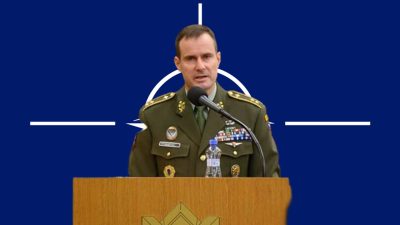Czech General Warns NATO ‘Is Currently on a Course’ for War with Russia

All Global Research articles can be read in 51 languages by activating the Translate Website button below the author’s name.
To receive Global Research’s Daily Newsletter (selected articles), click here.
Click the share button above to email/forward this article to your friends and colleagues. Follow us on Instagram and Twitter and subscribe to our Telegram Channel. Feel free to repost and share widely Global Research articles.
***
The commander of the Czech Republic’s armed forces said the North Atlantic alliance and Russia are on the path to a direct war. The general described the potential war as the “worst-case scenario” but emphasized that it remains a distinct possibility.
General Karel Rehka, the chief of the Czech armed forces general staff, told his country’s parliament on Monday about the potentiality of a war between NATO and Russia.
“No one wants it at all, but it is not impossible. It is necessary to stop saying that this is not possible, because it is simply possible. It can happen and it is necessary to prepare for it in the long run,” he said.
“We view war between Russia and the North Atlantic Alliance as the worst-case scenario, but it is not impossible,” Rehka continued. “It is possible… [Russia] is currently on a course towards a conflict with the Alliance.”
Tensions between Moscow and the West have spiraled in recent weeks. At a Group of Seven (G7) meeting earlier this month, Washington and its allies announced a plan to transfer F-16s to Ukraine. Russian Foreign Minister Sergey Lavrov said giving advanced fighter jets to Kiev is an “unacceptable escalation” and warned the West is “playing with fire.”
Additionally, Kiev has carried out a series of attacks inside of Russia. On May 3, two drones were fired at the Kremlin in an attempt to assassinate Russian President Vladimir Putin. Last week, a neo-Nazi militia allied with Kiev used American weapons to launch a cross-border raid against Moscow. Then, on Tuesday, Kiev attacked Moscow with several drones.
Rehka claimed that both Moscow and Brussels would like to avoid a direct conflict.
“But that doesn’t mean that Russia wants it or that it plans it,” Rehka said. “Certainly not now, just like we don’t want it. Everyone knows it would be a tragedy.”
While high-ranking officials in NATO nations say they hope to avoid a direct conflict with Russia, those nations continue to cross redlines set by Moscow. National Security Adviser Jake Sullivan recently asserted that Kiev could use arms it receives from Washington to attack the Crimean Peninsula. Secretary of State Antony Blinken previously acknowledged that targeting Crimea was a “red line” for the Kremlin.
*
Note to readers: Please click the share button above. Follow us on Instagram and Twitter and subscribe to our Telegram Channel. Feel free to repost and share widely Global Research articles.
Kyle Anzalone is news editor of the Libertarian Institute, opinion editor of Antiwar.com and co-host of Conflicts of Interest with Will Porter and Connor Freeman.
Featured image: General Karel Rehka (Source: TLI)

